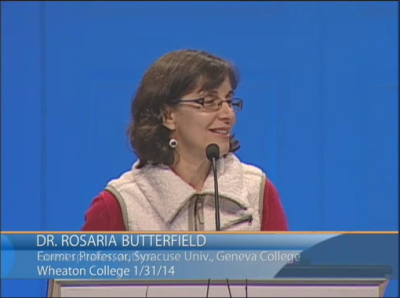Former Lesbian Explains Why She Signed the Nashville Statement

Speaker and author Rosaria Butterfield, a former lesbian, explained why she signed the Nashville Statement, which was released by a broad coalition of Christian leaders, including J. I. Packer and Francis Chan, articulating God's design for human identity as male and female.
"I stand with biblical orthodoxy, which is inseparable from God's creation mandate and definition of gendered personhood found in Genesis 1:27," Butterfield wrote in an article for the website of The Council on Biblical Manhood and Womanhood, as a reason for signing the statement.
"I signed the Nashville Statement because my conscience compels me so, because the promises of liberty on the world's terms are false and deceptive, and because many who currently claim to have Christ's forgiveness and salvation must be called to account for leading good people astray with false promises and filthy lies," she continued.
"I signed the Nashville Statement because the wolves are prowling, and the lions are roaring, and because they are bold and proud of their heresy, and because you must be warned."
The statement, which was sponsored by the CBMW and the Ethics & Religious Liberty Commission, was issued in Nashville, Tennessee, this week.
The document, which nearly 200 Christian leaders have signed and was described by Pastor John Piper as a "Christian manifesto" on human sexuality, contains a preamble and 14 articles.

"Evangelical Christians at the dawn of the 21st century find themselves living in a period of historic transition. As Western culture has become increasingly post-Christian, it has embarked upon a massive revision of what it means to be a human being. By and large the spirit of our age no longer discerns or delights in the beauty of God's design for human life," the preamble reads.
The issue, Butterfield wrote, is not primarily homosexuality; it's Scripture. "The issue is not primarily gay marriage," Butterfield explains. "It's whether 'the word of God is living and active, sharper than any two-edged sword, piercing to the division of soul and spirit, of joints and of marrow, and discerning the thoughts and intentions of the heart,'" she said, referring to Hebrews 4:12.
Butterfield recalled that she lived as a lesbian 20 years ago.
"I delighted in my lover, our home on one of the Finger Lakes, our Golden Retrievers, and our careers. When Christ claimed me for His own, I did not stop feeling like a lesbian. I did not fall out of love with women. I was not converted out of homosexuality. I was converted out of unbelief," she wrote.
"Conversion to Christ did not initially change my sexual attraction for women," she further explained. "What conversion did change immediately was my heart and mind. My mind was on fire for the Bible and I could not read enough of it or enough about it. The Gospel gave me a light that was ruinous. It ruined me for the life I had loved. The Lord's light illumined my sin through the law and illumined my hope through Jesus and the Gospel."
She said she learned that sin does not lose its character as sin because we loved it. "I learned that my homosexuality was a logical consequence of the fall of man, the thumbprint of original sin on some of us. It is true that some of us are born this way. It is also true that we are all born in sin, in one way or another. We can hate our sin without hating ourselves because we who have committed our lives to Christ stand in His righteousness and not our own. Our real identity is not in the sin we battle but in the savior we embrace."
Some evangelicals have expressed concerns over the Nashville Statement.
Author and Mere Orthodoxy founder Matthew Anderson said it contains many omissions and has "a very narrow ethical focus on same-sex sexual desires and questions of transgender identity."
Anderson, who holds a traditional biblical view on sex and gender, also argued that the statement inevitably creates an us versus them mentality — us being evangelicals and them being those who are not evangelicals — though that is likely not the intention of the statement's signers.
Those Christians who support same-sex marriage opposed the statement.
However, radio host Michael Brown wrote in an op-ed for The Christians Post, "From a biblical perspective, there is nothing controversial in the Nashville Statement, as it affirms sexual norms that have been taught by the Church for the last two millennia, including marriage being the union of one man and one woman."





















